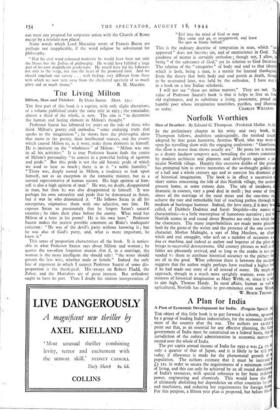The Living Milton
Milton, Man and Thinker. By Denis Saurat. (Dent. 15s.)
THE first part of this book is a reprint, with only slight alterations, of a volume published' under the same title in 1925 ; the remainder, almost a third of the whole, is new. The aim is " to determine the human and lasting element in Milton's thought."
Professor Saurat has laboured for years on the side of those who think Milton's poetry .still embodies " some enduring truth that speaks to the imagination " ; he shows here the philosophic ideas that move in the poetry, their intellectual sources, and the events which caused Milton to, as it were; make them elements in himself. He is insistent on the " wholeness " of 'Milton: " Milton was one in all his activities." It is true Professor Saurat finds the centre of Milton's personality " to consist in a powerful feeling of egotism and pride." But this pride is not the old Satanic pride of which we used to hear so much ; there is in it " a noble humility." "There was, deeply rooted in Milton, a tendency to look upon himself, not as an exception in the romantic • manner, but as a normal representative of human nature. His high opinion of him- self is also a high opinion of man." He was, no doubt, disappointed in man, but then he was also disappointed in himself. It was perhaps his own sensuality and pride that he denounced in. Satan, but it was he who denounced it. "He follows Satan in all his enterprises, stigmatises them with one adjective, one line. He exposes Satan so passionately that he forgets Satan's natural enemies • he takes their place before the enemy. What need has Milton Cof a hero in his poem? He is his own hero." Professor Saurat makes the neatest possible comment on Blake's inadequate criticism: " He was of the devil's party without knowing it ; but he was also of God's party, and, what is more important, he knew it."
This sense of 'proportion characterises all the book. It is notice- able in what Professor Saurat says about Milton and women ; he quOtes the too-often forgotten maxim that if, in a marriage, the woman is the more intelligent she should rule: "the wiser should govern the less wise, whether male or female." Indeed, the only line of argument in which I suspect Professor Saurat of some dis- proportion is the theological. His•essays on Robert Fludd, the Zohar, and the Mortalists are of great interest. But orthodoxy ought to have its part. 'Thus I doubt his sinister interpretation of " Evil into the mind of God or man May come and go, so unapproved, and leave No spot or blame behind."
This is the ordinary doctrine of temptation in man, which "us. approved " does not become sin, and of omniscience in God. The goodness of matter is certainly orthodox i though not, I allbw, ip being " of the substance of God," yet its relation to God Incarnate The relation of the " categories" of body and soul to that identity which is both, being a man, is a matter for learned theologians, Even the theory that both body and soul perish at death, though to be re-created later, was held by the orthodox.. I have met it in a book on a late Italian scholastic.
I will not say " these are minor matters." They are not. The value of Professor Saurat's book is that it helps to free us fr old nightmares, and to substitute a living, passionate, proud aril humble poet whose imagination nourishes, purifies, and illumine






















 Previous page
Previous page